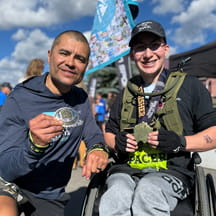In the fall of 2020, 20-year-old Hannah Larson was diagnosed with COVID-19. She experienced moderate, borderline severe illness, but months after her diagnosis, Larson was still fatigued. She was experiencing brain fog and struggled to find comprehensive treatment.
Her symptoms weren’t improving on their own. Larson took the semester off from nursing school and avoided bright or busy rooms and spending too much time with other people. She focused her efforts on resting and recovering. “I just couldn’t really do anything; it felt like this consumed my life,” she says. Soon thereafter, a family friend found the Post-COVID-19 Rehabilitation Clinic at Kennedy Krieger Institute in Baltimore, Maryland.
The program launched in July 2020 and approaches post-COVID from an interdisciplinary perspective, streamlining and coordinating care for patients up to 21 years old.
“Our goal is to help patients get back to their lives, and that’s really what pediatric rehabilitation is all about—getting kids to live as functional and normal lives as possible,” says Melissa Trovato, M.D., director of rehabilitation at Kennedy Krieger.
By the spring of 2021 specialists at the clinic met with Larson and her family. “We were all hopeful,” says Larson. “I’d started to feel like I was just going to be stuck like this.”
Pulling from broad experience in rehabilitation, staff at the clinic can lean on their own expertise and knowledge. “There might not be a one-treatment-fits-all solution, but as we assess the patient, it will drive what the care will look like in standardizing protocols,” says Trovato.
There are three specific areas of concern and focus for the clinic stemming from COVID-19 that inform patient care, including: intensive care unit patients, behavioral health-related effects and issues related to the nervous system. Larson was recommended for a specialized transition program to help combat the ongoing effects of COVID-19. Within months, she was attending clinic five hours a day, five days a week for five straight weeks to work with a neuropsychologist and behavioral health, occupational and physical therapists.
In addition to clinic treatment, Larson received her COVID-19 vaccine. She was hopeful that receiving the vaccine would help her feel better. Some long-haul COVID patients report improvement in their symptoms after getting vaccinated. While this wasn’t Larson’s experience, she remained excited about getting the vaccine. “I feel safer now,” she says.
The clinic focuses on individualized treatment plans for patients, using behavioral, lifestyle and medical treatments. “Our goal is to support them as their body recovers, focusing on functioning and quality of life,” says Laura Malone, M.D., Ph.D., co-director of the Pediatric Post-COVID-19 clinic and pediatric neurologist.
“We find that children are gradually improving over time. One of the most important things we do is to validate the symptoms and concerns that patients are having since this is a newer disease.” While setbacks are expected and some days are easier than others, Larson regained her strength after an intense, focused recovery and returned to school for the fall semester. “It was my main goal, and now that I get to be back with my friends and family too, it’s really like a whole world better,” says Larson.
“The progress I made at Kennedy Krieger was really amazing,” says Larson. “It had a 180-degree effect on me.”
The stability of service rounds is inherently dependent on the commitment of the staff who facilitate these rounds. Their commitment to the required follow through is vital to yielding ongoing benefits. As the hospital continues to focus on patient satisfaction, this proactive service approach can continue to serve as a model of multidisciplinary health care in hospital settings.



